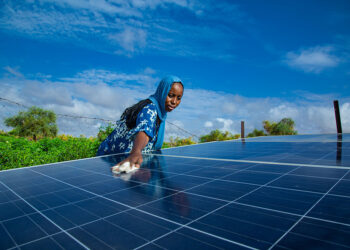Nigeria has proved that despite capital drought that has stagnated development of Africa’s hydrocarbon potentials, ongoing reforms embarked by the present administration have opened investment inflows into the industry.
Though Nigeria is spearheading the process of floating the Africa Energy Bank (AEB), to bridge funding gap in the sector, statistics have shown that the industry has attracted significant investment opportunities in the last few months.
The AEB, an institution founded by the African Petroleum Producers Organization (APPO) and African Export-Import Bank (Afreximbank), is being formed to address Africa’s energy funding gap by providing capital for both fossil fuel and renewable energy projects.
The bank, based in Abuja, Nigeria, was established to decrease reliance on foreign capital and ensure Africa can finance its own energy needs to improve energy access, drive industrialization, and reduce energy poverty. Initial funding has come from member states like Nigeria, Angola, and Ghana, and the bank has a goal of $120 billion in assets.
The AEB aims to finance projects in the oil, gas, and renewable energy sectors, which have historically faced a lack of investment.
By funding projects, the bank will help Africa develop its own energy infrastructure to meet the needs of its population, with the goal of eliminating energy poverty.
Investment in energy projects will create jobs and foster economic growth, contributing to the industrialization of the continent and the AEB will provide support for both traditional fossil fuels and new renewable energy sources, helping to create a balanced energy portfolio.
Global View Of Capital Drought
A recent report has highlighted challenges facing development of Africa’s oil and gas industry.
The report says that for Africa to unlock full potentials of her extractive industry especially hydrocarbon resources, regional governments must deepen regulatory reforms, promote fiscal transparency and align investment incentives with global standards, while also building regional partnerships to share critical infrastructure and mitigate security threats.
Africa’s oil and gas sector, though rich in natural reserves, continues to lose billions in potential revenue due to chronic infrastructure gaps, according to Deloitte’s latest West Africa Oil and Gas Outlook 2025.
Deloitte, further identified five interlinked challenges facing the oil and gas sector on the African continent.
According to its 2025 Deloitte West Africa Oil and Gas Outlook, they are constrained access to funding for independents, a persistent cost premium effect, ongoing security threats to critical infrastructure, limited regulatory collaboration and insufficient enabling infrastructure.
While some of these issues are structural and longstanding, the report highlighted that others have been exacerbated by new political, economic, and energy transition dynamics.
Together, these challenges define a uniquely African landscape for 2025, one that demands adaptive thinking and long-term resolve.
Meanwhile, the report says access to capital remains the most defining pressure point for the region’s independent oil producers.
While international oil companies (IOCs) continue to operate with deep financial buffers and global portfolio balance sheets, African independents face tightening margins and investor hesitancy.
The ESG [Environmental, Sustainability and Governance] pressures, divestment from fossil fuels, poor corporate governance practices, and perceived regulatory and political risks in African markets have made capital both scarce and expensive”, the report mentioned.
According to the report, this capital drought has led to a concentration of additional investments among those few big players with access.
Beyond financing constraints, Deloitte underscored that the lack of cross-border regulatory collaboration and the limited development of enabling infrastructure, including pipelines, refineries and storage facilities, continue to impede efficiency and value addition within the sector.
The report concluded that for Africa to unlock the full potential of its hydrocarbon resources, governments must deepen regulatory reforms, promote fiscal transparency and align investment incentives with global standards, while also building regional partnerships to share critical infrastructure and mitigate security threats.
Nigeria Turning Into Africa’s Oil And Gas Hub
According to reliable statistics, Nigeria’s upstream oil and gas sector has attracted $18.2 billion in investment commitments in 2025, driven by the approval of 28 new Field Development Plans (FDPs).
These projects are expected to add approximately 600,000 barrels of oil per day and over 2 billion standard cubic feet of gas daily, significantly boosting production.
This growth is attributed to reforms under the Petroleum Industry Act (PIA) which has improved transparency and competitiveness in the sector.
Among key fiscal reforms by the government is the reduction of signature bonuses for oil blocks from about $100 million to $10 million.
The chief executive of the Nigerian Upstream Petroleum Regulatory Commission (NUPRC) said Mr Gbenga Komolafe, said the downward review of the signature bonuses was among several strategic reforms introduced to reposition Nigeria’s upstream petroleum sector for growth and competitiveness.
“This single policy shift has enhanced investor confidence, enabled early field development, and reaffirmed Nigeria’s standing as a transparent investment destination,” Komolafe said.
He added that the NUPRC has implemented a fully digital and transparent licensing framework to improve efficiency and reduce human interference during bid rounds.
According to him, the 2024 mini-bid round minimised human interface, ensuring maximum transparency and fairness in the licensing process.
Komolafe explained that the Commission has prioritised production optimisation and enhanced oil recovery by supporting brownfield projects and reviewing field development plans.
He added that the Commission has also enabled the re-entry of shut-in wells to boost output and support Nigeria’s production recovery efforts.
“These interventions are projected to deliver incremental production exceeding one million barrels of oil per day by 2027,” he said.
Komolafe stressed the importance of secure infrastructure and credible measurement systems for sustainable crude production growth.
He disclosed that NUPRC’s collaboration with security agencies, private contractors, and host communities has produced significant results.
“Through the Upstream Measurement and Advance Cargo Declaration Regulations, crude oil theft has fallen by 90%, from 102,000 barrels daily in 2021 to 9,600 in September 2025,” he said.
Komolafe stated that the Commission is also advancing host community development through the Host Communities Development Trust (HCDT) under the Petroleum Industry Act (PIA) 2021.
He said that over 90 Trusts have been established across the Niger Delta, ensuring that development funds reach the communities directly.
“This model promotes local ownership, guarantees stability, and secures continuity in production — key pillars of sustained energy security,” he added.
Komolafe said the resurgence in Nigeria’s upstream sector was due to deliberate reforms anchored on transparency, efficiency and inclusiveness.
He noted that NUPRC’s vision aligns with Nigeria’s broader economic agenda and global sustainability goals.
“We are advancing the national gas agenda under the ‘Decade of Gas’ initiative to promote gas as a transition fuel and catalyst for industrial growth,” he said.
Citing the International Energy Agency (IEA), Komolafe said global upstream investment was expected to exceed $580 billion in 2025.
He added that Nigeria is well-positioned to attract its fair share as hydrocarbons continue to meet the energy needs of developing nations.
“While renewables will grow, hydrocarbons remain vital to industrialisation in emerging economies. The key is to ensure responsible, transparent production,” he explained.
Reflecting on NUPRC’s progress, Komolafe recalled that the Commission inherited a sector battling declining investment and regulatory uncertainty.
He said the passage of the Petroleum Industry Act in 2021 provided clarity, transparency, and predictability for recovery and growth.
“Today, the building blocks for an upstream rebound are firmly in place,” he affirmed.
“In 2025 alone, 28 new Field Development Plans have already been approved, unlocking an additional 1.4 billion barrels of oil and 5.4 trillion cubic feet of gas. These projects are expected to add nearly 600,000 barrels of oil per day and more than 2 billion standard cubic feet of gas per day, supported by $18.2 billion in committed capital expenditure.
“Together, these outcomes demonstrate that Nigeria’s upstream sector is not only on a growth trajectory but is also attracting the scale of investment needed to sustain its role as a premier global energy hub,” Komolafe said.
The NUPRC boss noted that the President Bola Tinubu-led government and the Commission are responding with bold reforms and strategic actions to turn challenges into opportunities amidst global pressures for energy transition.
He, therefore, asked investors to seize the vast opportunities ahead of the launch of Nigeria’s next oil licensing round.
Highlighting the dividends of the reforms, Komolafe disclosed that the commission has conducted licensing initiatives such as the 2022 Petroleum Prospecting Licences (PPLs), the Mini-Bid Round for deep offshore blocks, and the landmark 2024 Licensing Round, which was adjudged transparent by operators and stakeholders including the Nigeria Extractive Industries Transparency Initiative (NEITI).
“Beyond the successes of our data acquisition campaigns and licensing rounds, every key metric on our performance dashboard reflects widening access and exceptional investor participation. Rig activity, for instance, has surged from just eight in 2021 to 70 today, out of which 41 are drilling on site.
“Production has also risen significantly, from 1.46 million barrels per day in October 2024 to around 1.8 million barrels per day.
Major Final Investment Decisions (FIDs) , such as the $5 billion Bonga North and $500 million Ubeta Gas Project, underscore renewed long-term investor confidence, with several more expected soon,” the NUPRC chief executive disclosed.
Komolafe maintained that energy transition is a matter of energy security for the continent and Nigeria. This, he noted, has led to the reforms aligned with the country’s transition strategy which is the ‘Decade of Gas’.
Pointing out how the Petroleum Industry Act (PIA), 2021, reshaped and brought clarity to the Nigerian oil and gas industry, he explained that it ushered in fiscal reforms and investor-centric policies anchored on transparency, ethical governance, clarity, predictability, sustainability, competitiveness, and investor confidence.
According to him, the NUPRC, established by the PIA, has issued 24 regulations benchmarked against global standards to restore confidence and stability, and reiterated that the three Executive Orders issued by Tinubu in 2024 have further incentivised Nigeria’s oil and gas sector.
As part of moves toward a just transition, Komolafe said Nigeria is embedding climate responsibility at the heart of its upstream reforms through a robust decarbonisation framework that integrates Monitoring, Reporting and Verification (MRV) systems, carbon capture and storage, and access to carbon markets.
He emphasised that the administration of the Host Communities provisions of the PIA has strengthened trust and cooperation, enabling companies to operate more effectively, explaining that these outcomes demonstrate that Nigeria’s upstream sector is not only on a growth trajectory but also attracting the scale of investment needed to sustain its role as a premier global energy hub.
He further stated that investors now have unprecedented access to both mature and frontier basins, which have been incentivised with favourable fiscal terms.
“As we prepare to launch Nigeria’s next block licensing round, I extend a warm invitation to our local and global partners to join us in this journey,”





